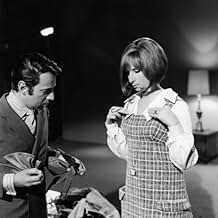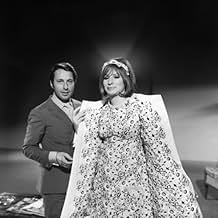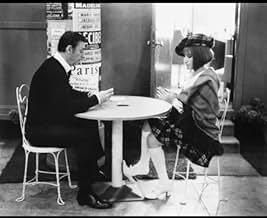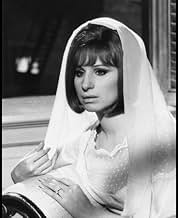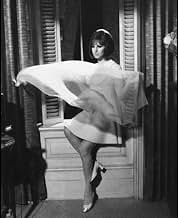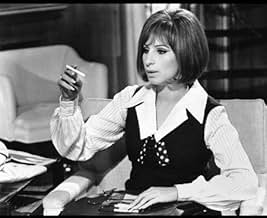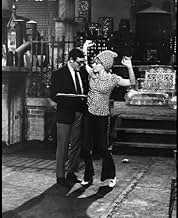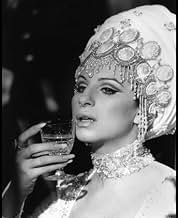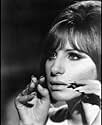AVALIAÇÃO DA IMDb
6,4/10
4,5 mil
SUA AVALIAÇÃO
Uma jovem problemática que visita um psicoterapeuta para ajudá-la a parar de fumar passa por hipnose e se vê revivendo um trágico romance vitoriano de uma vida passada.Uma jovem problemática que visita um psicoterapeuta para ajudá-la a parar de fumar passa por hipnose e se vê revivendo um trágico romance vitoriano de uma vida passada.Uma jovem problemática que visita um psicoterapeuta para ajudá-la a parar de fumar passa por hipnose e se vê revivendo um trágico romance vitoriano de uma vida passada.
Avaliações em destaque
10Xanadu-2
On A Clear Day improves and is more enjoyable for each viewing. The first time I saw it was such a huge elephant of a movie, a baffling entertaining jumble. So many ideas propped into one movie to make it popular and a box office hit in a time of change and when the big movie companies were desperately seeking hits to save themselves from ruin.
So this movie is crammed when ingredients that had proven successful in earlier movies in the 60´s : Barbra Streisand and a musical score (Funny Girl), gigantic sets and costumes in 19th century style (My Fair Lady), 60´s mod clothing, a big European star for the overseas market (Montand), new young stars (Nicholson) for counterculture hippy flavor, student riots (very 'now' then), reincarnation and telepathy (sci-fi), british accents both snobby and cockney (swinging London)
Barbra is one of the biggest talents of the 20th century and was born a little too late. Those huge musicals she stars so well in where dated then and she would have been better off in the 40s or 50s. She is very beautiful, womanly and sexy when she is in period costume. In the modern scenes she is fascinating and a little annoying when she´s trying to be a kooky 60´s chick à la Twiggy.
Yves Montand is miscast even though he has earthy European charm. He is unbelievable because he cannot pronounce the dialouge!!!!! His diction is a disaster and didn´t do the film any favors. Was there really no other singer for the male lead?
The songs are very good and underrated. Why does one never hear them as other musical classics? The direction from Vincente Minelli works since the film is very lush and enthralling. The period costumes by Cecil Beaton are beautiful without being too much and look great on Babs. The snazzy Scaasi mod clothes are a hoot!
It is very ambitious combinig so many elements and hope it works. Despite it all the film does have charm and one is drawn into 2 hours of pure Hollywood entertainment and at the same time it is fascinating to see one of the very last old time Hollywood productions. (It was already outdated when it was released 1970. Bad timing; the movie must have seemed as ancient as a dinosaur. It was apparently longer. There was supposedly a scene with Babs, Jack and 'Warren' at a disco but it got cut I would LOVE to see the original version!!!!! This is good fun to watch on rainy day forever
So this movie is crammed when ingredients that had proven successful in earlier movies in the 60´s : Barbra Streisand and a musical score (Funny Girl), gigantic sets and costumes in 19th century style (My Fair Lady), 60´s mod clothing, a big European star for the overseas market (Montand), new young stars (Nicholson) for counterculture hippy flavor, student riots (very 'now' then), reincarnation and telepathy (sci-fi), british accents both snobby and cockney (swinging London)
Barbra is one of the biggest talents of the 20th century and was born a little too late. Those huge musicals she stars so well in where dated then and she would have been better off in the 40s or 50s. She is very beautiful, womanly and sexy when she is in period costume. In the modern scenes she is fascinating and a little annoying when she´s trying to be a kooky 60´s chick à la Twiggy.
Yves Montand is miscast even though he has earthy European charm. He is unbelievable because he cannot pronounce the dialouge!!!!! His diction is a disaster and didn´t do the film any favors. Was there really no other singer for the male lead?
The songs are very good and underrated. Why does one never hear them as other musical classics? The direction from Vincente Minelli works since the film is very lush and enthralling. The period costumes by Cecil Beaton are beautiful without being too much and look great on Babs. The snazzy Scaasi mod clothes are a hoot!
It is very ambitious combinig so many elements and hope it works. Despite it all the film does have charm and one is drawn into 2 hours of pure Hollywood entertainment and at the same time it is fascinating to see one of the very last old time Hollywood productions. (It was already outdated when it was released 1970. Bad timing; the movie must have seemed as ancient as a dinosaur. It was apparently longer. There was supposedly a scene with Babs, Jack and 'Warren' at a disco but it got cut I would LOVE to see the original version!!!!! This is good fun to watch on rainy day forever
ON A CLEAR DAY opens with two extraordinary sequences. Firstly, with Babs singing the title song, there is a montage of flowers growing at speed in front of our very eyes, a decisively Minnellian melange of colour and artifice to create a real eye-dazzlingly emotional explosion which reaches an ecstatic crescendo as Babs skips through a maze of floral abundance. This is followed by a chilling, antithetical credits sequence, a VERTIGOesque assembly-line of diminishing rectangles in cool, gorgeous colours, in which the familiar Broadway music feels distorted and distant.
These two sequences encapsulate the film's conflict - between heart and mind; emotion and intellect; freedom and order; dream and reality; self-expression and conformity. In 1970, the age of BONNIE AND CLYDE, M*A*S*H and WOODSTOCK, a Minnelli/Lerner/Streisand musical must have seemed amusingly quaint, but today, we can marvel at its audacity and flair, while many of its more acclaimed contemporaries seem tinny and shrill.
The narrative proper seems initially mundane after such abstract excess. Daisy Gamble (perfect name!) interrupts a lecture by famed psychologist, Marc Chabot, being accidentally hypnotised as he demonstrates on a pupil. She is a scatty, ditzy loudmouth who has come to Chabot in the hope that he will manipulate her out of a 5-packs a day smoking habit to please her ultra-conformist fiance, Warren, who has a career-crucial business dinner.
Chabot has little interest in this clumsy pest until he discovers that she has some psychic powers. Intrigued, he explores her through hypnosis and discovers her past-life as a supremely resourceful, sexually magnetic, orphaned Cockey golddigger of the Regency, who is standing trial for espionage and treason, her caddish husband having deserted her. Chabot begins to fall in love with this remarkable woman, and believing, against all his rationalist principles, in reincarnation.
Even by Minnelli's standards, this is a bravely open-ended picture, not only in its unexpected denouenment, but in refusing to simplify the bewildering, complicated emotions his characters become prey to. On a simple structural level, he contrasts conformity with the life of emotion and imagination. Chabot is a doctor whose devotion to science and facts is almost monkish in its celibate form. His office is the embodiment of conformity, a bland brown pervading walls, chairs, fittings, barred windows, books, even his own clothes. Despite being Yves Montand, he is no French lover.
Into his life comes this impossible woman whose striving for fiance-pleasing order results in further chaos. In her second incarnation, as Melinda, she brings bawdiness, vulgarity, romance, humour, daring, but, most of all, colour, sumptuous, ravishing, blinding colour. The effect she has on Chabot is reflected in the film's form, which moves from steady, mid-level, classical compositions, to outrageous fancy, dizzying camera movements, mercurial editing cutting across time and space. Chabot soon begins to have Daisy's dreams, while she becomes divided from herself in a remarkable visualisation of the split between duty and desire.
But it's not enough to suggest simplistic dichotomies - even the 'normal' Daisy has a rooftop garden which is simply magical (isn't that such a lovely idea, a woman who makes flowers grow quickly by talking to them?), while her fiance, like Darrin from BEWITCHED, is so desperate to conform that he becomes mad. 'Sciences', such as psychoanalysis are invoked in the spirit of the times, but the Pandora's Box they open in no way 'explain', but sets free, as Chabot ruefully recognises.
This is all significantly gendered as men try to control and explain a woman who darts gleefully through history, place, morality, while barely taking a break. As ever with Minnelli, the celebration of artifice only reveals how repressive real-life is, and his satire is cutting if you care to look. This is an undervalued, joyous, sad coda to one of Hollywood's greatest careers (Minnelli would go on to make only one more movie), as full of invention and love as his first film, CABIN IN THE SKY.
The music is fine, with little of the heartache as GIGI or fun of MY FAIR LADY. Montand is charming in a thankless role, but Barbara Streisand - and, God help me, I never thought I'd say this - is an absolute joy in a double (treble?) role, especially convincing in saucy period dress, yet, moving when she needs to be.
These two sequences encapsulate the film's conflict - between heart and mind; emotion and intellect; freedom and order; dream and reality; self-expression and conformity. In 1970, the age of BONNIE AND CLYDE, M*A*S*H and WOODSTOCK, a Minnelli/Lerner/Streisand musical must have seemed amusingly quaint, but today, we can marvel at its audacity and flair, while many of its more acclaimed contemporaries seem tinny and shrill.
The narrative proper seems initially mundane after such abstract excess. Daisy Gamble (perfect name!) interrupts a lecture by famed psychologist, Marc Chabot, being accidentally hypnotised as he demonstrates on a pupil. She is a scatty, ditzy loudmouth who has come to Chabot in the hope that he will manipulate her out of a 5-packs a day smoking habit to please her ultra-conformist fiance, Warren, who has a career-crucial business dinner.
Chabot has little interest in this clumsy pest until he discovers that she has some psychic powers. Intrigued, he explores her through hypnosis and discovers her past-life as a supremely resourceful, sexually magnetic, orphaned Cockey golddigger of the Regency, who is standing trial for espionage and treason, her caddish husband having deserted her. Chabot begins to fall in love with this remarkable woman, and believing, against all his rationalist principles, in reincarnation.
Even by Minnelli's standards, this is a bravely open-ended picture, not only in its unexpected denouenment, but in refusing to simplify the bewildering, complicated emotions his characters become prey to. On a simple structural level, he contrasts conformity with the life of emotion and imagination. Chabot is a doctor whose devotion to science and facts is almost monkish in its celibate form. His office is the embodiment of conformity, a bland brown pervading walls, chairs, fittings, barred windows, books, even his own clothes. Despite being Yves Montand, he is no French lover.
Into his life comes this impossible woman whose striving for fiance-pleasing order results in further chaos. In her second incarnation, as Melinda, she brings bawdiness, vulgarity, romance, humour, daring, but, most of all, colour, sumptuous, ravishing, blinding colour. The effect she has on Chabot is reflected in the film's form, which moves from steady, mid-level, classical compositions, to outrageous fancy, dizzying camera movements, mercurial editing cutting across time and space. Chabot soon begins to have Daisy's dreams, while she becomes divided from herself in a remarkable visualisation of the split between duty and desire.
But it's not enough to suggest simplistic dichotomies - even the 'normal' Daisy has a rooftop garden which is simply magical (isn't that such a lovely idea, a woman who makes flowers grow quickly by talking to them?), while her fiance, like Darrin from BEWITCHED, is so desperate to conform that he becomes mad. 'Sciences', such as psychoanalysis are invoked in the spirit of the times, but the Pandora's Box they open in no way 'explain', but sets free, as Chabot ruefully recognises.
This is all significantly gendered as men try to control and explain a woman who darts gleefully through history, place, morality, while barely taking a break. As ever with Minnelli, the celebration of artifice only reveals how repressive real-life is, and his satire is cutting if you care to look. This is an undervalued, joyous, sad coda to one of Hollywood's greatest careers (Minnelli would go on to make only one more movie), as full of invention and love as his first film, CABIN IN THE SKY.
The music is fine, with little of the heartache as GIGI or fun of MY FAIR LADY. Montand is charming in a thankless role, but Barbara Streisand - and, God help me, I never thought I'd say this - is an absolute joy in a double (treble?) role, especially convincing in saucy period dress, yet, moving when she needs to be.
On A Clear day You can See Forever is truly a wonderful, feel good movie. Barbra Streisand's portrayl of Daisy Gamble is absolutely endearing. The character of Daisy is so sweet and child-like, and at the same time cooky and hysterically clumsy. In the very same movie she also portrays a sophisticated seductress of Brittish decent from the 19th century. Completely the opposite of her Daisy Gamble character. Daisy goes to see a doctor to help her quit smoking and while under hypnosis reveals the personality of Melinda, the Brittish seductress. Her doctor falls for Melinda, but is not in any way interested in Daisy in a romantic way. However, Daisy thinks the doctor is falling in love with her, and she certainly is falling in love with him. It is this plot, combined with the movies vivid color and great songs, as well as Barbra's wonderful dimmensions of acting in this film, and a terrific supporting cast, that make it such a treat to watch. By the end of the movie, you TRULY, REALLY "FEEL" Daisy's sense of feeling better about herself and loving herself for who she is. Although I have enjoyed Barbra's other musicals,(some more than others),this one is the only one that, I feel, truly leaves you with a sense of wonderment. On A Clear day You Can See Forever is an EXCELLENT, WONDERFUL movie. A visual and audial treat. Enjoy it.
Okay, granted you have to like Barbra Streisand to love this movie. But for those of you who don't, it's worth a catch just to see Bob Newhart and Jack Nicholson as "young" men. Jack is especially funny in his short scenes with Barbra and her fiancée...
But the main reason to see this flick is the acting and musical talent of Barbra. She has to STRETCH to play a mousy crowd follower, and then switch it up to play a haughty wealthy socialite in a past time period. The costumes are out of this world, and the film should have won an academy award for costume design, although Barbra's figure did her costumes justice. The periods in history represented by the film are stunningly presented. All in all, this is my favorite movie of all time. There is laughter, sorrow, drama, singing, dancing, lots of Barbra skin showing, sexuality, scorn, mocking, a panorama of events and celebrations and Barbra's eventual awakening as her own person. I salute Vicente Minnelli, post mortem.
But the main reason to see this flick is the acting and musical talent of Barbra. She has to STRETCH to play a mousy crowd follower, and then switch it up to play a haughty wealthy socialite in a past time period. The costumes are out of this world, and the film should have won an academy award for costume design, although Barbra's figure did her costumes justice. The periods in history represented by the film are stunningly presented. All in all, this is my favorite movie of all time. There is laughter, sorrow, drama, singing, dancing, lots of Barbra skin showing, sexuality, scorn, mocking, a panorama of events and celebrations and Barbra's eventual awakening as her own person. I salute Vicente Minnelli, post mortem.
On A Clear Day came at the end of the Movie Musical Cycle that started strong from MY FAIR LADY. Once the market became supersaturated with musicals (Half A Sixpence, Dr. Doolittle), the beauty of the movie musical wore off.
On A Clear Day started life as the next go-round for Richard Rodgers. After he retired working with Oscar Hammerstein, he partnered with Alan Lerner and they started to write this musical. Rodgers backed out of the project but the show made it to Broadway with Barbara Harris in the lead. It was respectfully received but never did blockbuster business. In fact, if it weren't for the song "What Did I Have?" it would almost be forgotten.
Enter Vincente Minelli and Ms. Streisand. Together, they took the idea and ran with it until it became a big, bright, lovely movie. The old songs (the title song and "What Did I Have") are rendered priceless by Barbra who sings them as emotional tour-de-forces. The new songs (a cute duet "Go To Sleep" and "Love With All The Trimmings") are wonderful. In fact, the latter was filmed a la Tom Jones. In short, everything about the film worked.
Originally it was three hours long and intended as a road show production (tickets ordered in advance; two shows a day). Paramount went for the fast buck and they trimmed it to under two hours. Yes, what is left is priceless and wonderful but I wish they would release the Director's Cut of this musical. If what we see today is still excellent, I can't help but wonder about what they took out.
On A Clear Day started life as the next go-round for Richard Rodgers. After he retired working with Oscar Hammerstein, he partnered with Alan Lerner and they started to write this musical. Rodgers backed out of the project but the show made it to Broadway with Barbara Harris in the lead. It was respectfully received but never did blockbuster business. In fact, if it weren't for the song "What Did I Have?" it would almost be forgotten.
Enter Vincente Minelli and Ms. Streisand. Together, they took the idea and ran with it until it became a big, bright, lovely movie. The old songs (the title song and "What Did I Have") are rendered priceless by Barbra who sings them as emotional tour-de-forces. The new songs (a cute duet "Go To Sleep" and "Love With All The Trimmings") are wonderful. In fact, the latter was filmed a la Tom Jones. In short, everything about the film worked.
Originally it was three hours long and intended as a road show production (tickets ordered in advance; two shows a day). Paramount went for the fast buck and they trimmed it to under two hours. Yes, what is left is priceless and wonderful but I wish they would release the Director's Cut of this musical. If what we see today is still excellent, I can't help but wonder about what they took out.
Você sabia?
- CuriosidadesAccording to the 1974 biography "Barbra Streisand: The First Decade", this was originally envisioned as a three-hour "road show" extravaganza, and included many sequences of Daisy's other lives (photos of which were printed in some pre-release promotions), but director Vincente Minnelli and the studio felt it would be too long, especially since musicals had already begun to fail at the box office. In addition to all but the briefest of Jack Nicholson's scenes being cut, a musical number sung by him and Streisand, "Who Is There Among Us Who Knows?," was also cut, as well as "Wait Till We're Sixty-Five," a duet between Larry Blyden and Barbra Streisand. Producer Howard W. Koch conducted a search for the deleted footage in 1994, particularly Nicholson's song, which he wanted to showcase during the AFI tribute to the actor. Nothing turned up at Paramount. Koch asked Streisand and Minnelli's widow if they had remnants of the cut footage, but neither did. Koch determined that if the film still exists, it's probably in a mislabelled canister.
- Erros de gravaçãoThe telephone ring in Chabot's office is not a typical Bell company ring, even though the story is supposedly set in New York.
- Citações
Dr. Marc Chabot: I used to be in love with answers, but since I've known you I'm just as astounded by questions. Answers make you wise, questions make you human.
- ConexõesFeatured in Paramount Presents (1974)
Principais escolhas
Faça login para avaliar e ver a lista de recomendações personalizadas
- How long is On a Clear Day You Can See Forever?Fornecido pela Alexa
Detalhes
- Data de lançamento
- País de origem
- Idioma
- Também conhecido como
- On a Clear Day You Can See Forever
- Locações de filme
- Empresa de produção
- Consulte mais créditos da empresa na IMDbPro
Bilheteria
- Orçamento
- US$ 10.000.000 (estimativa)
- Faturamento bruto nos EUA e Canadá
- US$ 14.000.000
- Faturamento bruto mundial
- US$ 14.000.000
Contribua para esta página
Sugerir uma alteração ou adicionar conteúdo ausente

